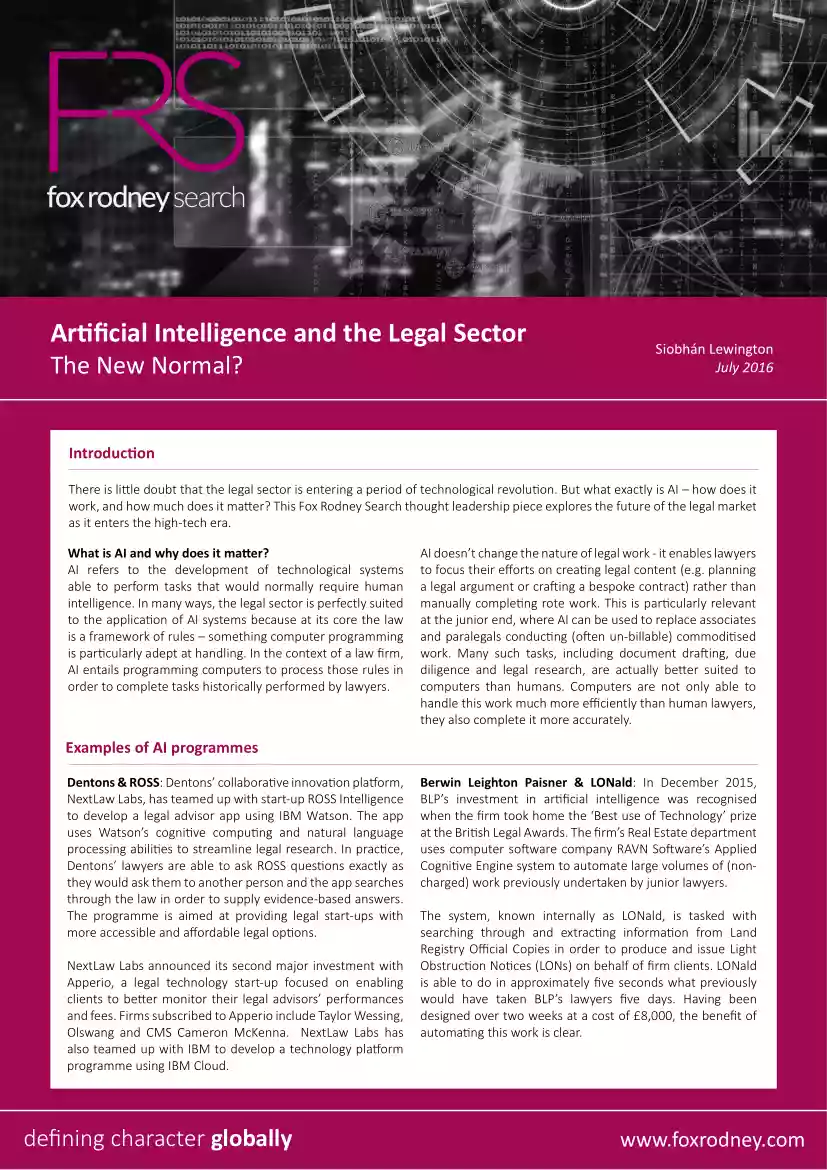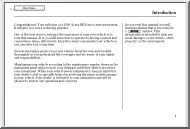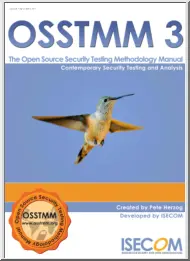Comments
No comments yet. You can be the first!
What did others read after this?
Content extract
Source: http://www.doksinet Artificial Intelligence and the Legal Sector The New Normal? Siobhán Lewington July 2016 Introduction There is little doubt that the legal sector is entering a period of technological revolution. But what exactly is AI – how does it work, and how much does it matter? This Fox Rodney Search thought leadership piece explores the future of the legal market as it enters the high-tech era. What is AI and why does it matter? AI refers to the development of technological systems able to perform tasks that would normally require human intelligence. In many ways, the legal sector is perfectly suited to the application of AI systems because at its core the law is a framework of rules – something computer programming is particularly adept at handling. In the context of a law firm, AI entails programming computers to process those rules in order to complete tasks historically performed by lawyers. AI doesn’t change the nature of legal work - it enables
lawyers to focus their efforts on creating legal content (e.g planning a legal argument or crafting a bespoke contract) rather than manually completing rote work. This is particularly relevant at the junior end, where AI can be used to replace associates and paralegals conducting (often un-billable) commoditised work. Many such tasks, including document drafting, due diligence and legal research, are actually better suited to computers than humans. Computers are not only able to handle this work much more efficiently than human lawyers, they also complete it more accurately. Examples of AI programmes Dentons & ROSS: Dentons’ collaborative innovation platform, NextLaw Labs, has teamed up with start-up ROSS Intelligence to develop a legal advisor app using IBM Watson. The app uses Watson’s cognitive computing and natural language processing abilities to streamline legal research. In practice, Dentons’ lawyers are able to ask ROSS questions exactly as they would ask them to
another person and the app searches through the law in order to supply evidence-based answers. The programme is aimed at providing legal start-ups with more accessible and affordable legal options. NextLaw Labs announced its second major investment with Apperio, a legal technology start-up focused on enabling clients to better monitor their legal advisors’ performances and fees. Firms subscribed to Apperio include Taylor Wessing, Olswang and CMS Cameron McKenna. NextLaw Labs has also teamed up with IBM to develop a technology platform programme using IBM Cloud. defining character globally Berwin Leighton Paisner & LONald: In December 2015, BLP’s investment in artificial intelligence was recognised when the firm took home the ‘Best use of Technology’ prize at the British Legal Awards. The firm’s Real Estate department uses computer software company RAVN Software’s Applied Cognitive Engine system to automate large volumes of (noncharged) work previously undertaken by
junior lawyers. The system, known internally as LONald, is tasked with searching through and extracting information from Land Registry Official Copies in order to produce and issue Light Obstruction Notices (LONs) on behalf of firm clients. LONald is able to do in approximately five seconds what previously would have taken BLP’s lawyers five days. Having been designed over two weeks at a cost of £8,000, the benefit of automating this work is clear. www.foxrodneycom Source: http://www.doksinet How will AI impact the legal sector? In some ways, the impact AI will have on law firms seems clear cut: it will increase fee earners’ efficiency by reducing the burden of rote work currently shouldered by junior lawyers. As benign as that may sound, the implications for the legal market are likely to be both profound and widespread, prompting some commentators to go as far as to predict that AI will lead to the disappearance of traditional lawyers altogether. If this is true, what do the
law firms of tomorrow look like? Who will be the winners and losers in this new landscape? What does a career in the legal sector hold in store for today’s junior lawyers? The specific answers to those questions are yet to be determined, but a number of likely trends can already be charted. The end of the traditional law firm structure With sophisticated AI programmes already encroaching on the work currently conducted by associates, paralegals and contract attorneys, the traditional law firm pyramid structure seems increasingly unfit for purpose. Firms are already anticipating being able to replace many of their current paralegals and/or contract attorneys with technology platforms in the coming years. It seems we are now moving towards an era in which firms across the board have fewer junior lawyers and lower leverage models. The implications of this shift will be widespread, ranging from reducing the demand for junior legal professionals, to reshaping the daily responsibilities
and career trajectories of those junior lawyers who still make the cut, to redefining the real estate requirements of modern law firms. Such changes will certainly influence the shape of law firms of the future. New winners and losers in a bifurcated legal market As AI increasingly commoditises legal services, we will also likely witness the bifurcation of the legal sector, with firms either steering into AI or away from it. Dentons and BLP are two notable examples of firms that have teamed up with industry providers to develop AI capabilities, hoping to develop strong platforms while the relevant technology is still emerging. That these firms have made such significant investments despite law firms’ partnership structures encouraging a short-term view on expensive initiatives is testament to how seriously they are taking the AI challenge. Other firms are responding to the rise of AI by targeting the opposite end of the market, focusing on providing bespoke and strategic advice in
‘bet the company’ scenarios. Already among London’s most lowly leveraged and highly-profitable law firms, this elite group is relatively well defined, comprising a select few high-end US firms and (even fewer) UK firms. As the market bifurcates, the firms most at risk will be those left in the middle - those that continue to rely on their brand names and institutional clients to generate business. Many such firms have turned to near-shoring as a means of protecting their bottom lines, but by avoiding the challenge of AI rather than addressing it, these firms risk being overtaken by more agile market contemporaries. New and disruptive market participants It is no surprise that many of the firms venturing into AI have done so by teaming up with players ranging from industry titan IBM to legal technology start-ups. As the increasing commoditisation of large amounts of legal work shifts clients’ focus from the purely legal to include technical expertise, law firms will need to
prepare to compete not just amongst themselves, but with technology-based providers as well. There is a view that if law firms aren’t quick to grasp the opportunities AI creates, those opportunities may well be seized by industry outsiders. A new normal? While AI will never fully capture the complexity of human disputes and negotiation - nor the lawyers who broker those interactions - the impact it will have on the legal sector should not be underestimated. Tasks currently being undertaken by paralegals and junior lawyers will continue to be automated. This means that junior lawyers will have a different kind of early career experience, perhaps even better than before. The use of AI will make law firms more efficient and this in turn will free partners to spend more time advising clients and becoming even more key strategic advisors. Over the next few years, AI will no longer be a competitive advantage but a ‘new normal’ in the legal sector. Firms that don’t adapt to this
new, high-tech era will not be able to go the distance. By Siobhán Lewington July 2016 For more information please speak to Siobhán Lewington slewington@foxrodney.com, or your usual FRS contact defining character globally
lawyers to focus their efforts on creating legal content (e.g planning a legal argument or crafting a bespoke contract) rather than manually completing rote work. This is particularly relevant at the junior end, where AI can be used to replace associates and paralegals conducting (often un-billable) commoditised work. Many such tasks, including document drafting, due diligence and legal research, are actually better suited to computers than humans. Computers are not only able to handle this work much more efficiently than human lawyers, they also complete it more accurately. Examples of AI programmes Dentons & ROSS: Dentons’ collaborative innovation platform, NextLaw Labs, has teamed up with start-up ROSS Intelligence to develop a legal advisor app using IBM Watson. The app uses Watson’s cognitive computing and natural language processing abilities to streamline legal research. In practice, Dentons’ lawyers are able to ask ROSS questions exactly as they would ask them to
another person and the app searches through the law in order to supply evidence-based answers. The programme is aimed at providing legal start-ups with more accessible and affordable legal options. NextLaw Labs announced its second major investment with Apperio, a legal technology start-up focused on enabling clients to better monitor their legal advisors’ performances and fees. Firms subscribed to Apperio include Taylor Wessing, Olswang and CMS Cameron McKenna. NextLaw Labs has also teamed up with IBM to develop a technology platform programme using IBM Cloud. defining character globally Berwin Leighton Paisner & LONald: In December 2015, BLP’s investment in artificial intelligence was recognised when the firm took home the ‘Best use of Technology’ prize at the British Legal Awards. The firm’s Real Estate department uses computer software company RAVN Software’s Applied Cognitive Engine system to automate large volumes of (noncharged) work previously undertaken by
junior lawyers. The system, known internally as LONald, is tasked with searching through and extracting information from Land Registry Official Copies in order to produce and issue Light Obstruction Notices (LONs) on behalf of firm clients. LONald is able to do in approximately five seconds what previously would have taken BLP’s lawyers five days. Having been designed over two weeks at a cost of £8,000, the benefit of automating this work is clear. www.foxrodneycom Source: http://www.doksinet How will AI impact the legal sector? In some ways, the impact AI will have on law firms seems clear cut: it will increase fee earners’ efficiency by reducing the burden of rote work currently shouldered by junior lawyers. As benign as that may sound, the implications for the legal market are likely to be both profound and widespread, prompting some commentators to go as far as to predict that AI will lead to the disappearance of traditional lawyers altogether. If this is true, what do the
law firms of tomorrow look like? Who will be the winners and losers in this new landscape? What does a career in the legal sector hold in store for today’s junior lawyers? The specific answers to those questions are yet to be determined, but a number of likely trends can already be charted. The end of the traditional law firm structure With sophisticated AI programmes already encroaching on the work currently conducted by associates, paralegals and contract attorneys, the traditional law firm pyramid structure seems increasingly unfit for purpose. Firms are already anticipating being able to replace many of their current paralegals and/or contract attorneys with technology platforms in the coming years. It seems we are now moving towards an era in which firms across the board have fewer junior lawyers and lower leverage models. The implications of this shift will be widespread, ranging from reducing the demand for junior legal professionals, to reshaping the daily responsibilities
and career trajectories of those junior lawyers who still make the cut, to redefining the real estate requirements of modern law firms. Such changes will certainly influence the shape of law firms of the future. New winners and losers in a bifurcated legal market As AI increasingly commoditises legal services, we will also likely witness the bifurcation of the legal sector, with firms either steering into AI or away from it. Dentons and BLP are two notable examples of firms that have teamed up with industry providers to develop AI capabilities, hoping to develop strong platforms while the relevant technology is still emerging. That these firms have made such significant investments despite law firms’ partnership structures encouraging a short-term view on expensive initiatives is testament to how seriously they are taking the AI challenge. Other firms are responding to the rise of AI by targeting the opposite end of the market, focusing on providing bespoke and strategic advice in
‘bet the company’ scenarios. Already among London’s most lowly leveraged and highly-profitable law firms, this elite group is relatively well defined, comprising a select few high-end US firms and (even fewer) UK firms. As the market bifurcates, the firms most at risk will be those left in the middle - those that continue to rely on their brand names and institutional clients to generate business. Many such firms have turned to near-shoring as a means of protecting their bottom lines, but by avoiding the challenge of AI rather than addressing it, these firms risk being overtaken by more agile market contemporaries. New and disruptive market participants It is no surprise that many of the firms venturing into AI have done so by teaming up with players ranging from industry titan IBM to legal technology start-ups. As the increasing commoditisation of large amounts of legal work shifts clients’ focus from the purely legal to include technical expertise, law firms will need to
prepare to compete not just amongst themselves, but with technology-based providers as well. There is a view that if law firms aren’t quick to grasp the opportunities AI creates, those opportunities may well be seized by industry outsiders. A new normal? While AI will never fully capture the complexity of human disputes and negotiation - nor the lawyers who broker those interactions - the impact it will have on the legal sector should not be underestimated. Tasks currently being undertaken by paralegals and junior lawyers will continue to be automated. This means that junior lawyers will have a different kind of early career experience, perhaps even better than before. The use of AI will make law firms more efficient and this in turn will free partners to spend more time advising clients and becoming even more key strategic advisors. Over the next few years, AI will no longer be a competitive advantage but a ‘new normal’ in the legal sector. Firms that don’t adapt to this
new, high-tech era will not be able to go the distance. By Siobhán Lewington July 2016 For more information please speak to Siobhán Lewington slewington@foxrodney.com, or your usual FRS contact defining character globally





 Just like you draw up a plan when you’re going to war, building a house, or even going on vacation, you need to draw up a plan for your business. This tutorial will help you to clearly see where you are and make it possible to understand where you’re going.
Just like you draw up a plan when you’re going to war, building a house, or even going on vacation, you need to draw up a plan for your business. This tutorial will help you to clearly see where you are and make it possible to understand where you’re going.